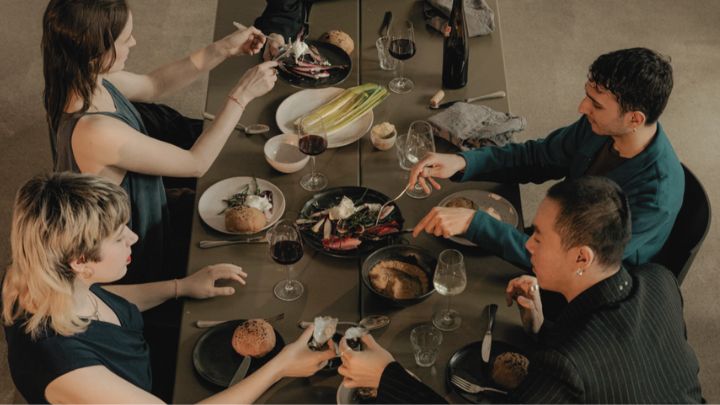Positive thinking alone won’t make you live longer. Specially if you’re completely alone.
Women generally outlive men by an average of 6–8 years in ‘’developed’’ countries. A 2015 ‘Lancet’ study showed men in these countries have double the death rate at any age compared to women.
But, Blue Zones are different. In these areas, like Sardinia, men and women live equally long. Sardinia has 6x more centenarians than mainland Italy and 10x more than North America.
The key factor? Strong social connections.
Did you know that a lack of social ties is more harmful than obesity, smoking, or high blood pressure, and it increases dementia risk by 50%?
Curious about more? Dive into our article at Avea; we explore the diverse benefits of social connection and how it is linked to increased longevity.
Discover the importance of social connections, differences in cultural approaches, and practical tips for strengthening relationships.
In this article
Free guide to reverse your biological age

- Master the science of rejuvenation.
- Apply proven tips to turn back the clock.
- Transform your health with top longevity specialists.
The key to longevity: strong social connections
Genes only account for about 25% of your longevity. The other 75% depends on your lifestyle. So what does it take to live to 100 or beyond? What are people from the Blue Zones doing right?
These people’s lives constantly intersect. In all ancient civilizations, defence and social cohesion define its design. The issue is that urban priorities have now shifted during the industrial revolution.
Now, social isolation is the public health risk of our time. Studies show that ⅓ of the participants admit having only 2 or fewer people to rely on.
In the Blue Zones, as people age, and indeed across their lifespans, they’re always surrounded by extended family, by friends, by neighbours, the priest, the barkeeper, the grocer.
People are always there or dropping by. They are never left to live solitary lives. This is unlike the rest of the ‘’developed’’ world, where individualism is largely increasing.
Learn more about the Blue Zones: 11 secrets of the longest lived.
“Happiness is having a large, loving, caring family in another city.”-
centenarian in Sardinia.
The science of longevity and social connections
You might be surprised to learn that factors like clean air and hypertension treatment, whilst important, don’t top the list in predicting lifespan.
Even regular exercise and being at a healthy weight, traditionally emphasised for long life, fall behind in the ranking.
What really stands out? It’s the strength and nature of our social interactions.

A key finding is that our social fabric – both the close relationships and casual, everyday interactions – significantly impacts our longevity.
These aren’t just casual correlations; they are deeply rooted in our biology. For instance, having a close-knit circle of friends who are there for you in times of need – for emotional support, healthcare decisions, or even existential crises – plays a crucial role in how long you’ll live. They may help you from going down a stress pitfall. And stress is the silent killer.
The concept of ‘social integration’ emerges as a powerful predictor of lifespan. This doesn’t just mean your inner circle, but also the number of daily interactions you have, however brief or superficial they may seem.
Everyday conversations, whether with your boss, hairdresser, or the neighbour walking their dog, play a crucial role in social integration. Far from mere small talk, these interactions are vital for a longer, healthier life.
Free Longevity Ebook
For the health and longevity enthusiasts of all walks of life—Good news! Avea has an Ebook specially designed for you!
You don’t have to be an expert to unravel the science behind vitality. With our free Ebook, delve into the realm where biology and lifestyle intersect.
- Backed by science: Understand the biology underpinning each recommendation.
- Action plans: Every chapter leaves you with a step-by-step guide.
- Tried and true: Our customers have already boosted their well-being using our solutions.
Physical health benefits of social connections
Strong social ties significantly impact physical health, crucial for longevity. People with close relationships have a lower risk of cardiovascular diseases, thanks to reduced stress and better heart health.
These bonds also boost immune function, helping to fend off illnesses. The social interactions can decrease inflammation, a key factor in preventing chronic diseases and ageing.
This explains the longer lifespans in Blue Zones, where community and connection are integral. Essentially, nurturing your social ties is as vital for your health as diet and exercise, forming a core part of longevity.
Influence on healthier habits
Social networks profoundly influence our lifestyle choices, steering us towards healthier habits. People surrounded by strong social ties are more likely to eat balanced diets, attend regular medical checkups, and steer clear of detrimental habits such as smoking.
This is partly because friends and family often encourage and motivate each other to make healthier choices. Social groups provide a support system for maintaining physical fitness, often through shared activities like group exercises or sports.

In essence, our social circles don’t just enrich our lives emotionally; they actively propel us towards better health and longevity.

One study found that more than 80% of centenarians communicate with a friend or family member daily (Elder Care Alliance, 2018).
Cognitive stimulation and mental agility
Social interactions are a catalyst for cognitive development, enhancing mental agility, creativity, and problem-solving skills. Engaging in conversations and activities with a diverse group of people exposes us to new perspectives and ideas, stimulating intellectual growth.
This cognitive stimulation is crucial in maintaining mental sharpness and adaptability, especially as we age. By regularly interacting with others, we challenge our brains to think in novel ways, boosting our cognitive functions and contributing to long-term brain health, an essential component of longevity.
Emotional well-being and mental health
Social connections play a pivotal role in our emotional well-being and mental health. They provide an antidote to loneliness and cultivate a sense of belonging, which is fundamental to our emotional stability.

Having a supportive network of friends and family offers a safe space for emotional expression and support during challenging times, thereby enhancing our overall mental health.
These connections contribute to improved mood and increased happiness. The shared joys and sorrows in these relationships bring about a sense of fulfilment and contentment, essential for a balanced and satisfying life.
Sense of purpose and life satisfaction
Belonging to a social network offers more than just companionship; it instils a profound sense of purpose and life satisfaction. This feeling of connectedness and being part of something larger than oneself contributes significantly to our overall well-being.
It’s not just about having people around; it’s about feeling integrated and valued within these relationships. This sense of belonging and purpose has been shown to enhance life satisfaction, a key ingredient for a long and fulfilling life.
In essence, our social ties weave a fabric of support and meaning, crucial for sustaining both our mental and emotional health, and ultimately, our longevity.
Different cultures and perspectives of social connections
Around the globe, the way cultures nurture social connections varies significantly, each offering unique insights into longevity.
In Eastern cultures like China, Confucian values emphasise family loyalty, often resulting in multi-generational households providing a strong support network.
Similarly, in India, the traditional joint family system plays a crucial role in emotional and social support.
Arab countries also value extended family and community, with social life often revolving around shared meals and religious practices.
Contrast this with Western cultures, where there’s a focus on individualism and independence.
In the United States and Europe, for example, adults commonly live separately from their parents, with social connections extending to friends, colleagues, and social groups.
This approach values personal space and autonomy but also embraces diverse social networks.
In Africa, the concept of Ubuntu, “I am because we are,” highlights community interconnectedness. African societies also typically emphasise extended family and community roles, with storytelling and communal events strengthening generational bonds.
Meanwhile, in South America, vibrant family structures are central. Countries like Brazil and Argentina cherish familism, with family loyalty extending to neighbourhood and community celebrations, creating robust support systems.
What about online interactions?

In today’s digital age, online interactions are on top. But do they have the same effect as face-to-face contact?
The answer, grounded in neuroscience, is a sweet no.
Direct, in-person interactions trigger a cascade of neurotransmitters like oxytocin and dopamine, which foster trust, reduce stress, and create a sense of well-being. This biochemical reaction is absent in online interactions.
Elizabeth Redcay’s research at the University of Maryland illustrates this beautifully. Her studies show that live interactions light up parts of the brain linked with attention, social intelligence, and emotional rewards far more than when consuming static content, like watching a video.
This difference is so profound that it not only influences how we perceive each other – with voices and body language conveying intelligence and emotion – but it also has tangible health benefits.
Women, often more focused on maintaining face-to-face relationships, have a biological advantage over men in this regard. This is mirrored in our primate relatives, as shown by anthropologist Joan Silk’s research on female baboons.
The impact is far-reaching: lower dementia rates, increased survival rates from illnesses like breast cancer, and better recovery from events like strokes are all linked to active, in-person social lives.
The message is clear: prioritising and nurturing face-to-face interactions isn’t only for the pictures; it’s a fundamental component of our health and longevity.
How to strengthen your close relationships
Deepening the relationships you have with family and friends can be incredibly rewarding, both emotionally and for our overall longevity.
Here are some practical tips to enhance these vital connections:
- Prioritise regular meet-ups: When you’re super busy, it’s easy to let significant time pass without seeing your loved ones. Schedule regular meet-ups, whether it’s a weekly or bi-weekly dinner, monthly movie night, or even a yearly family getaway. Consistency helps strengthen bonds and creates shared memories.
- Engage in shared activities: Find common interests or hobbies you can enjoy together. It could be as simple as a weekly cooking session, attending a fitness class, or starting a book club. Shared activities create a sense of camaraderie and provide regular opportunities to connect.
- Foster open and honest communication: Strong relationships are built on trust and understanding. Encourage open dialogue where each person feels heard and valued. Whether it’s discussing life’s triumphs or challenges, effective communication will deepen your emotional connections.
- Celebrate milestones and support during hardships: Be there for each other during significant life events, both happy and difficult. Celebrating achievements and offering support during tough times reinforces the importance of your relationship.
- Create traditions and rituals: Establishing traditions, like annual family reunions or weekly/bi-weekly friend game nights, can create a sense of belonging and anticipation. These rituals become something everyone looks forward to and cherishes.
- Explore new experiences together: Trying new activities or visiting new places together can invigorate relationships. Whether it’s a local day trip or a foreign adventure, new experiences can bring fresh perspectives and excitement.
- Use technology when apart: If physical distance is a barrier, make use of technology to stay connected. Regular video calls, sharing photos, or playing online games together can keep the bond strong despite the miles, even if face-to-face meetings are better.
- Practice empathy and understanding: Put yourself in the other person’s shoes, especially during disagreements. Empathy cultivates a deeper understanding and respect, essential for long-lasting relationships.
- Invest time in individual relationships: While group activities are great, also make time for one-on-one interactions. This allows for more personal conversations and strengthens individual bonds within a group.
- Remember small gestures matter: Sometimes, it’s the small things that count. A thoughtful message, a surprise visit, or a simple act of kindness can go a long way in showing someone they’re valued.
Testimony from centenarians
I’ve never had trouble making friends, in that sense I’m really nice, I am. I’ve really had many friendships. (….) I have a reputation for being very talkative.
A queen, 104 years old.
I’ve always liked to have friends and get along well with everyone.
A king, 101 years old.
Taken from research published in journal of happiness studies.
















